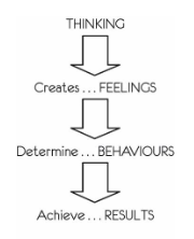Beechworth, VIC based Lindsay Tighe of Empowered Conversations has published a new article, titled "A Simple Question Can Change Your Life!" The article, which can be found on StyleMySoul.com, aims to help readers examine their thought processes and learn how they can break out of unsatisfactory routines.
“Let’s start by sharing some interesting research that few people are aware of,” the article says. “We all have something like 60,000 thoughts every day and typically will have about 95% of the same thoughts again tomorrow as what we had today. How boring! It is clear that we have lots of routines and habits that ensure our thinking becomes habitual and routine and, let’s face it, many of us procrastinate and don’t deal with issues, meaning we repeat the same thoughts again and again.”

Some may be content to continue in this manner, but others will find themselves looking to make further progress in their personal development. Tighe says the key is to get serious about breaking the cycle of habitual thinking; each thought may not be valuable on its own, but its ability to gather momentum as new thoughts enter the inner conversation should be accorded due respect. And the easiest way to do this is by asking questions.
A question, is valuable because it causes the person to start thinking (even if they posed the question themselves) and when thinking changes, things change. Tighe says, “A question is actually a gift! I am sure you’ve never thought of a question as a gift before but let’s acknowledge that ordinarily we don’t get many new thoughts, and a new thought has the potential to powerfully, positively and profoundly change your life!”
She also points out that there are a few ‘golden rules’ anyone can follow to enable questioning to be most effective. For instance, a person should stick to questions that put their thoughts on the path to a solution rather than simply contributing to the cycle they were already in. For example, asking “How can I” rather than “Why?” enables more positive thinking leading to better outcomes.
Similarly, people should practice keeping an open mind when asking themselves questions. If they start off with the assumption that there is no answer or the path is impossible, they are denying themselves an opportunity to truly reexamine the situation and uncover possible answers. Instead of challenging thinking the question will be ineffective because new possibilities are not considered., t Anyone who wishes to read further can find the article by Lindsay Tighe on StyleMySoul.com.
Tighe is a communication skills trainer based in Australia who offers online courses and training to anyone interested in developing this aspect of their life. Communication plays a vital role in both a personal and professional context, and Tighe has made it her mission to help people grow into better people and better leaders — those who can honestly ask better questions of themselves as well as the people around them. In fact, she has written a book on the subject, aptly titled Better Leaders Ask Better Questions. It is currently available on multiple platforms.
Those interested in taking new steps on their personal development journey are welcome to read the article in full. They may also reach out to Lindsay Tighe and Empowered Conversations to learn more about the communication training courses and other resources they offer at www.empoweredconversations.com.au.
